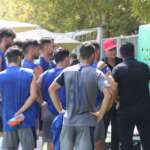In a move aimed at bolstering the team for the upcoming season, Tractor Club of Tabriz has appointed Dragan Skocic, the former Iranian national team coach, as their new head coach. The announcement follows successful negotiations led by Tractor’s acting CEO, Saeed Mozafarizadeh.
Skocic emerged as the favored candidate after the club considered a number of options for the head coach position. This experienced Croatian manager boasts a distinguished resume, including stints with Croatia’s U-21 national team, clubs across the Middle East and Iran, and most notably, Iran’s senior national team (Team Melli). His trophy cabinet includes two championship titles from Slovenia and Croatia.
Skocic’s tenure with Team Melli was particularly impressive. He compiled a remarkable record of 15 wins, 1 draw, and only 2 losses – a testament to his tactical prowess. However, his successful World Cup qualification campaign with Iran was unfortunately cut short due to reported internal politics within the Iranian Football Federation (FFIRI), who opted for the return of Carlos Queiroz despite Skocic’s achievements.
Skocis was a victim of backstabbing by several senior Team Melli members who were pushing the FFIRI for a return of Carlos Queiroz even though Skocic led Iran to the FIFA World Cup 2022 with relative ease and with three matches to spare.




